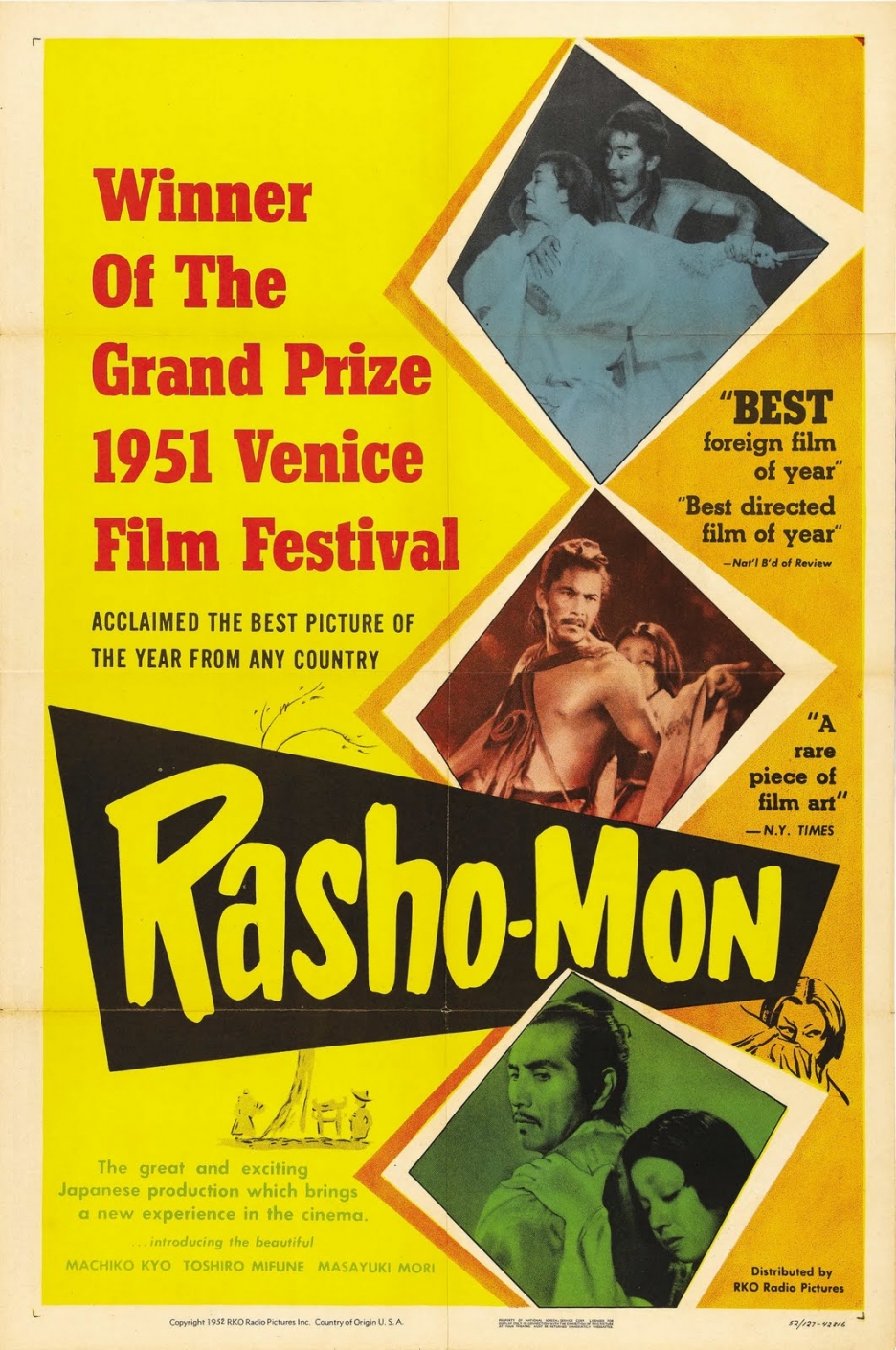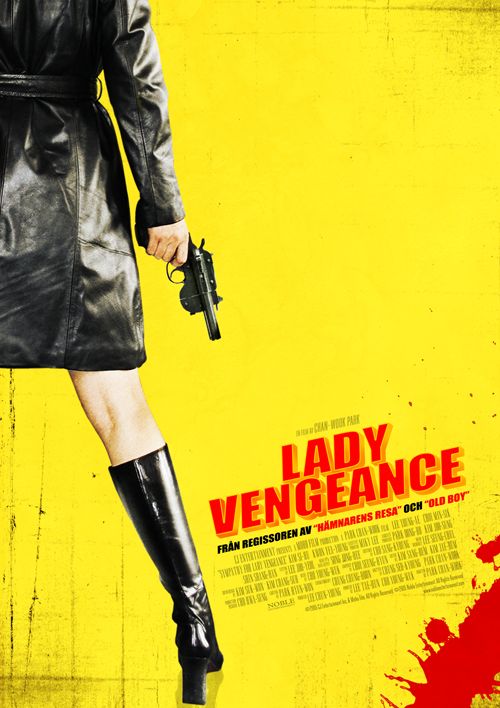Rashomon
 "It's human to lie. Most of the time we can't even be honest with ourselves."
"It's human to lie. Most of the time we can't even be honest with ourselves."
—The skeptical commoner's response to the conflicting testimonies sums up the plight of man in Akira Kurosawa's multilayered film.
Battle Royale
 It's always quite special when you can see a film on the big screen for the first time. This was especially true of Kinji Fukasaku's Battle Royale, which, until its recent run at a revival theater here in L.A., had never been given a theatrical release in the U.S. The film is in the tradition of movies such as The Most Dangerous Game, Lord of the Flies, and Punishment Park—a series of circumstances unfold that places a group of people in a deserted space to either be hunted or turned into animals in captivity who must redefine “survival of the fittest.” Besides the ultra-violence laden with dark satire, the film is unique because those playing the game are a bunch of ninth graders from modern Japan, equipped with bizarre, sometime useless tools, and forced to kill each other or be killed by their own government. Even more bizarre is that the person to initiate them into the game is a former teacher, pushed to the edge by their insolence. The final flare comes in the form of two mysterious transfer students, each a willing participant in the hunt.
It's always quite special when you can see a film on the big screen for the first time. This was especially true of Kinji Fukasaku's Battle Royale, which, until its recent run at a revival theater here in L.A., had never been given a theatrical release in the U.S. The film is in the tradition of movies such as The Most Dangerous Game, Lord of the Flies, and Punishment Park—a series of circumstances unfold that places a group of people in a deserted space to either be hunted or turned into animals in captivity who must redefine “survival of the fittest.” Besides the ultra-violence laden with dark satire, the film is unique because those playing the game are a bunch of ninth graders from modern Japan, equipped with bizarre, sometime useless tools, and forced to kill each other or be killed by their own government. Even more bizarre is that the person to initiate them into the game is a former teacher, pushed to the edge by their insolence. The final flare comes in the form of two mysterious transfer students, each a willing participant in the hunt.
The story begins with an announcement about the new BR (Battle Royale) Act, in which students will be chosen at random to be pitted against each other due to their lack of respect for adults. This announcement is followed by a glimpse of reporters shoving to get a glimpse of a young girl, the latest survivor of a BR course. We then cut to a ninth grade class that's a bit more anarchic than usual. After writing on the chalkboard that they've decided to take the day off, Noriko (Aki Maeda), a kindhearted favorite in the class, approaches her befuddled teacher Mr. Kitano (Takeshi Kitano), seeking an explanation for the absence of her peers. Kitano exits without comment only to meet a ballsy student with a knife that slashes him. The teacher leaves the school and everything returns to normal for the most part. At the end of the year the school organizes a class trip in which everyone is loaded onto a bus for a retreat, including drop outs who've come back to school just for the field trip. The knifer is one of those students, and he is close friends with Shuya (Tatsuya Fujiwara), who recently lost his father to suicide. The students are thoroughly enjoying themselves, and Noriko even gathers up the courage to approach Shuya with a bundle of cookies she's baked just for him. Everyone takes a little nap and Shuya wakes to find his peers and teacher gassed while two menacing people wearing masks navigate the bus. Once he's found awake he is knocked unconscious.
Lady Vengeance
 "Everyone makes mistakes. But if you sin, you have to make atonement for it...Big atonement for big sins. Small atonement for small sins."
"Everyone makes mistakes. But if you sin, you have to make atonement for it...Big atonement for big sins. Small atonement for small sins."
—Geum-ja's (played by Yeong-ae Lee) words to her young daughter Jenny serve as an emotional lesson in morality from Chan-wook Park's 2005 Lady Vengeance.
Blind Beast

A blind masseuse turns to sculpture when the thrill of touch becomes so tormenting that he needs an outlet for his desires. For every woman who he's ever worked on, there is an oversized replica of her limbs protruding from the walls of his studio. Of all the female clients that he and co-workers have massaged, Aki (Mako Midori) has always been an exceptional study in beauty. As the current muse of an avant guard artist, she exists only to be admired. Her figure becomes a target for Michio (Eiji Funakoshi), the blind sculptor, and with the help of his mother (Noriko Sengoku) he kidnaps the model with the hope of being able to immortalize her body in clay.
Michio and his mother live in a secluded warehouse far from Tokyo, and Aki is locked into his studio and given an ultimatum. She can either willingly model for his sculpture in captivity and be released upon its completion, or she can succumb to being put unconscious for the work until he's finished. He explains that for a blind person life is agony. The joys of the remaining senses are absent; they function only as a means of nourishment and necessity. Of these remaining senses, touch has become something that Michio needs to flourish. He further explains that he wishes to pioneer the art of touch, claiming that the other senses, such as sound, have an art form to match. Unwilling to accept things such as music to add substance to his life, he's hellbent on making the physical discovery of the human body a branch of art.
Continue ReadingWhen a Woman Ascends the Stairs

Regardless of the decade, there aren't many Japanese films that I've seen that approach the human experience on a more common level. The Japanese directors who've upheld great popularity abroad usually deal more with the folklore and customs of ancient Japan, while directors such as Takashi Miike (Audition, Ichi the Killer) and Kinji Fukasaku (Battle Royale) deal more with ultra-violence and action. Perhaps the most popular, Akira Kurosawa, has made an impact on the western world because American cinema, particularly Westerns, were of great influence.
While in Ginza, Naruse and his close acquaintances were gathered in a bar and noticed something special about the matrons. The complexity of their relationship with their customers, vastly different than the relationship of a geisha or bartender, had never been breached in cinema. Fueled by intentions to bring something new to the screen and introduce the world to the life of a high-end hostess, Naruse crafted this film. Its emphasis on the common man and his relation to the world was not exactly something that made it popular, and this, along with the director's other works, has left many bored, if not unsatisfied. Ozu's popularity with similar themes of the common man have done well, so what makes them different? Could it be because Naruse shot something in 1960 about people in 1960? Is it the lack of action in his films, or the fact that he cast based on a person's resemblance to the character in terms of personality? Whatever the reason, this film, while praised by cinefiles, has failed to impress or be understood by the masses; many have yet to realize that the film is full of feminist theory, breathtaking cinematography, and an example of the hardships that come with middle age.
Continue ReadingIn the Realm of the Senses

"The concept of 'obscenity' is tested when we dare to look at something that we desire to see but have forbidden ourselves to look at. When we feel that everything has been revealed, 'obscenity' disappears and there is a certain liberation. " --Nagisa Ôshima
The true story of Sada Abe has been interpreted into film several times, including Noboru Tanaka's film A Woman Called Sada Abe a year before this one, and Nobuhiko Obayashi's Sada in '98. Sada Abe was convicted in 1936 after killing her lover, Kichizo, while performing erotic asphyxiation. When arrested days later she was found calm, carrying his genitals in her handbag with a glowing smile on her face, claiming that she couldn’t take his body or head with her, so she decided to take the part of him that had the most vivid memories. In Oshima's interpretation of their story, which is still banned in its uncut form in Japan, the tale was given not only a fresh face, but a wholly realistic new perspective. In it, Sada (Eiko Matsuda) is, as in real life, an ex-prostitute who found work as a servant in the home of a seemingly upstanding couple. The master, Kichizo (Tatsuya Fuji), becomes interested in her sexually and the two begin an affair. In attempts to avoid suspicion from his wife, she leaves their employ and the two set up shop at a nearby inn. There they are consumed by their unabashed lovemaking until Sada's nymphomania turns into a quest for sadomasochism. As their love inflames them, so do the dangers of its nature. Pain and punishment ultimately become the source of their newfound pleasure, and arguably, self-hatred.
Continue ReadingHouse (Hausu)

Hausu is not for everyone, though, if you find anime films and series to be amusing and tasteful, you'll probably enjoy this quirky Japanese horror flick. The comparison to anime is based upon the shared characteristics that this film has with the genre. Aside from the dizzy colors and characters with zany nicknames, it also sports a team of girls who fight against a docile villain. It seems as though anime always has this creepy bad guy in the shadows who has a glossy stare and speaks like an intellectual zombie. Like anime, House also has no real plot; the meat and potatoes is in the action and the effects.
However, it would be unjust to say that this movie is simply a live-action anime. Besides being a unique horror film, it also comes off as a Japanese ghost story, except the phantom is symbolized by a mythical cat named Blanche, the reincarnation of some evil spirit. Nobuhiko Ôbayashi, the director, also added a personal touch by working in a bit of his own history to the film. As a former pianist and medical student turned experimental filmmaker, the movie features a menacing piano that dismembers a character, and plenty of animated limbs. Ôbayashi should not only be praised for the artistic direction here, but for the fact that, like Spike Jonze, feature films weren’t always a part of his craft. The director is most prominent in Japan for his experimental films and TV commercials, the latter casting several big American stars, such as Kirk Douglas and Charles Bronson. House is actually his directorial debut, so you can imagine the liberties taken when he didn't have to cram all of his ideas into a few minutes.
Continue ReadingCarnival in the Night (Yami no carnival)

I'm starting to realize that, like certain record labels in music, film companies can also help steer you in the right direction when taking a chance on the unfamiliar. Besides the well-known Criterion restorations and releases of films held in high-esteem, Facets is another company that I'm beginning to see a great pattern with. I think it's safe to say that they deal with films that are a bit more obscure, which can sometimes mean taking a chance on something that you might hate. Carnival in the Night was not one of those cases.
Shot mostly in 16mm black and white with occasional transformations to color, the film is a visceral piece of art that should be applauded despite its subtle flaws. Using a documentary technique, director Masashi Yamamoto cast a small group of non-actors to more or less play themselves—each character linked to the sensational Kumi (Kumiki Ota). In the course of roughly 72 hours, you see the slums and residents of Shinjuku, Japan and Kumi's relation to them. Diving straight into the local punk scene, we see her band perform and you are immediately aware that this is a side of Japanese culture that you have never been exposed to.
Continue ReadingLate Bloomer (Osoi hito)

Picture, if you can, a film with the nightmarish quality of a Harmony Korine movie in Japanese, with a bit more focus on the characters and plot, that is deliberately presented as an avant-garde horror film. Late Bloomer is about as close to that combination as you're ever going to get. Not only is it toxic and arresting like the films of Korine, who I'll admit is one of my favorite directors, but the film is extremely off-putting.
As far as craft goes, it is shot in black and white (needed, I assume, for the eerie quality and mass bloodshed), with out-of-date dissolves and overlapping images that I haven't seen in years. The soundtrack is also jarring, mainly consisting of minimal electronic and death metal.
Continue ReadingSympathy for Mr. Vengeance

Sympathy for Mr. Vengeance is perhaps one of the best anti-hero films I have ever seen, based on concept alone. Chan-wook Park's Vengeance Trilogy is unlike most others because the plot, actors, and characters are all in no way linked or the same, but each film circulates around revenge. Ryu (Ha-kyun Shin) is a young deaf-mute who lives with his sister in a seedy apartment complex. His ambition was formerly focused on art school until his sister fell ill and needed a kidney transplant. He quit school and began working as a manual laborer in a factory in order to save up for her operation. Unable to give her one of his own kidneys because their blood types don't match, Ryu takes a chance and, using all the money that he has saved, tries to purchase a kidney from an illegal organ supply group which offers to give him the kidney he needs in exchange for one of his and 10 million won. But after waking up from the operation, he finds that the group has split with his clothes, money, and kidney.
Disheartened and furious about yet another streak of bad luck in his life, he vows to kill the people who wronged him. While visiting the medial center he frequents to find a donor, he receives the great news that they found a proper donor, which is hard to do in such a sort amount of time. The only problem is that Ryu has just been fired from his job and the operation costs 10 million won. Together, he and his girlfriend Cha-Yeong-mi (Doona Bae) decide to kill two birds with one stone by seeking vengeance on the illegal group and kidnapping his former employer's daughter for ransom in order to pay for his sister's operation.
Continue Reading




